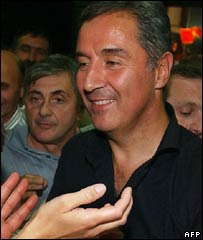bepi će polaziti???
Sognare si sa, non costa nulla... Sanjati je besplatno... Dreamin' is for free...

giovedì, ottobre 05, 2006
mercoledì, ottobre 04, 2006
ДАН ОДЛУЧАН

Danas pričaću sa njima i znaću ako moj san da radim u međunarodnoj koperaciji postaneće stvarnost ili ne..
Hajdemo! Sve u napad!!
martedì, ottobre 03, 2006
Djukanovic va in pensione

Annuncia la bbc che il Primo Ministro del Montenegro Milo Djukanovic - fresco di schiacciante vittoria elettorale - avrebbe deciso di lasciare la sua carica, dopo 15 anni di leadership.
Qualcuno gli avrà riferito che la monarchia è una forma di stato passata di moda.
Bosnia's Presidency may bring new ethnic split

Bosnia's latest general elections may mark the beginning of new political turmoil in the country and could lead to a further ethnic split. One member of the country's newly elected tripartite Presidency has pledged to eliminate Bosnia's ethnic political entities, while the party of another candidate has vowed to split the country if that were discussed.
The Presidency is shared by three politicians - one Bosnian Muslim, one Croat and one Serb - who rotate the office.
More than 24 hours after polls closed Sunday night in Bosnia- Herzegovina, the country's Election Commission said late Monday that former Bosnian foreign minister and premier Haris Silajdzic had received the majority of votes for the Bosnian Muslim seat on the country's tripartite Presidency.
Silajdzic has run the Party for Bosnia-Herzegovina (SBiH) since breaking his alliance with the late Bosnian Muslim leader Alija Izetbegovic nearly a decade ago.
He had the advantage in the race against incumbent Sulejman Tihic, the current chairman of the Presidency and head of the Muslim nationalist Party of Democratic Action (SDA).
Bosnian Serb Nebojsa Radmanovic of the Party of Independent Social-Democrats (SNSD) won the post of the Serb member of the Presidency from the traditionally stronger nationalist Serb Democratic Party (SDS).
During the campaign, Silajdzic's main issue was the unification of the country, which is still divided into two ethnic entities - the Serb-run Srpska Republic and the Muslim-Croat Federation. Silajdzic said he would seek to abolish the ethnic entities in order to strengthen the central government.
Bosnian Serb Premier Milorad Dodik, who leads Radmanovic's SNSD party, said he would fight moves to abolish the entities and threatened to call for a Bosnian Serb referendum demanding Srpska's independence from Bosnia if anyone tries to abolish the entity.
"If the requests for the dissolution of the Srpska Republic repeat, we have a right to a respond, possibly with a referendum," Dodik said shortly before the elections.
Political analysts in Bosnia believe that the situation could be further complicated if Silajdzic and Radmanovic, as the newly elected Muslim and Serb members of Bosnia's tripartite Presidency, continue with their heated campaign talk.
"If Silajdzic and Dodik (through the elected candidate Radmanovic) continue with their rhetoric, we can expect radicalization of the situation in Bosnia," political analyst Tanja Topic told Deutsche Presse-Agentur dpa.
"Such development will bring into question the withdrawal of the international community's Office of the High Representative (OHR) in Bosnia, expected in June 2007."
An extension of the OHR mission in Bosnia would significantly slow the country's progress toward European integration, indicating that the Bosnia-Herzegovina is not mature enough to face the responsibilities in the future of possible EU membership, she said.
"Such a situation would push us some five to 10 years back and would just prolong the agony of a certain international protectorate here," Topic said.
She said it is possible that Silajdzic and Dodik would cool their rhetoric once they take their seats in the Presidency, she said.
The Presidency's narrowly tailored executive authority, however, does not leave them much space for manoeuvring, she said.
A bigger problem in the Presidency might be the victory of Social- Democrat Zeljko Komsic over the nationalist Ivo Miro Jovic of the Croat Democratic Union (HDZ) for the Croat seat in the Presidency, Topic said.
The SDP's Komsic won the neck-and-neck race with Jovic, despite never enjoying widespread support from the Bosnian Croat electorate.
"It will probably happen that the Bosnian Croats would not accept Komsic and even boycott him as the Croat member of the Presidency, since he was not nominated by Croat parties but by the SDP," Topic said.
The Croat party admitted defeated by the SDP candidate in the presidential race, but the HDZ said it would soon consider steps to overturn Komsic's election, even if that means the election needs to be repeated.
A total of 54.8 per cent of the more than 2.7 million eligible voters in Bosnia-Herzegovina cast their ballots in the elections on Sunday.
Bosnia-Herzegovina, population 4.5 million, is 48 per cent ethnic Muslim, 34 per cent Serbs Orthodox Christians and 15 per cent Croat Catholics.
Voters in the Srpska Republic also voted for the entity's president and National Assembly, while voters in the Muslim-Croat Federation cast ballots for Parliament and the assemblies of 10 cantons of the Federation.
A total of 7,245 candidates in 36 political parties, eight coalitions and 12 independent candidates ran for posts in the general elections.

